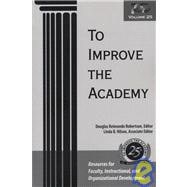
LINDA B. NILSON is founding director of Clemson University's Office of teaching Effectiveness and Innovation. She recently co-edited Enhancing Learning with Laptops in the Classroom (Jossey-bass, 2005) and revised her bestselling guidebook Teaching at Its Best: A research-Based Resource for College Instructors (Anker, 2003), now in its second edition. In addition to teaching a graduate course on college teaching, she leads faculty workshops at universities and conferences both nationally and internationally. Before coming to Clemson, she directed teaching centers at Vanderbilt University and the University of California-Riverside, and was on the sociology faculty at the University of California-Los Angeles.
| About the Authors | |
| Preface | |
| Introduction | |
| Ethical Guidelines for Educational Developers | |
| Educational Development and the Sociological Imagination | |
| It All Started in the Sixties: Movements for Change Across the Decades-A Personal Journey | |
| Living Engagement | |
| Surviving to Tenure | |
| Paradigms | |
| A Critical Theory Perspective on faculty development | |
| The ABCs of fractal Thinking in Higher Education | |
| Educational development and the Schlorship of Teaching and Learning | |
| Toward a Schlorship of Teaching and Learning in Educational Development | |
| Faculty Development Through Student Learning Initiatives: Lessons Learned | |
| Action research for Instructional Improvement: Using Data to Enhance Student Learning at Your Institution | |
| Moving From the Scholarship of teaching and Learning to Educational Research: An Example From Engineering | |
| Instructional and Curricular Development | |
| Structuring Complex Cooperative Learning Activities in 50-Minute Classes | |
| "Heritage Rocks": Priciples and Best Practices of Effective Intercultural Teaching and Learning | |
| How Do You handle This Situation? Responses by Faculty in Great Britain and the United States to Workshops on the Ethics of Teaching | |
| In the Eye of the Storm: Students' Perception of Helpful Faculty Actions Following a Collective Tragedy | |
| Sustaining the Undergraduate Seminar: On the Importance of Modeling and Giving Guidelines | |
| Teaching Business by Doing Business: An Interdisciplinary Faculty-Friendly Approach | |
| Faculty Careers | |
| The Schlorship of Civic Engagement: Defining, Documenting, and Evaluating Faculty Work | |
| How Post-Tenure Review Can Support the teaching Development of Senior Faculty | |
| Faculty development in Student Laerning Communities: Exploring the Vitality of Mid-Career Faculty Participants | |
| Making Meaning of a Life in Teaching: A Memoir-Writing Project for seasoned faculty | |
| Transforming a Teaching Culture Through Peer Mentoring: Connecticut College's Johnson Teaching Seminar for Incoming faculty | |
| Preparing Future Faculty for Careers in Academic Librianship: A Paradigm Shift for Collaboration in Higher education | |
| Bibliography | |
| Table of Contents provided by Publisher. All Rights Reserved. |
The New copy of this book will include any supplemental materials advertised. Please check the title of the book to determine if it should include any access cards, study guides, lab manuals, CDs, etc.
The Used, Rental and eBook copies of this book are not guaranteed to include any supplemental materials. Typically, only the book itself is included. This is true even if the title states it includes any access cards, study guides, lab manuals, CDs, etc.